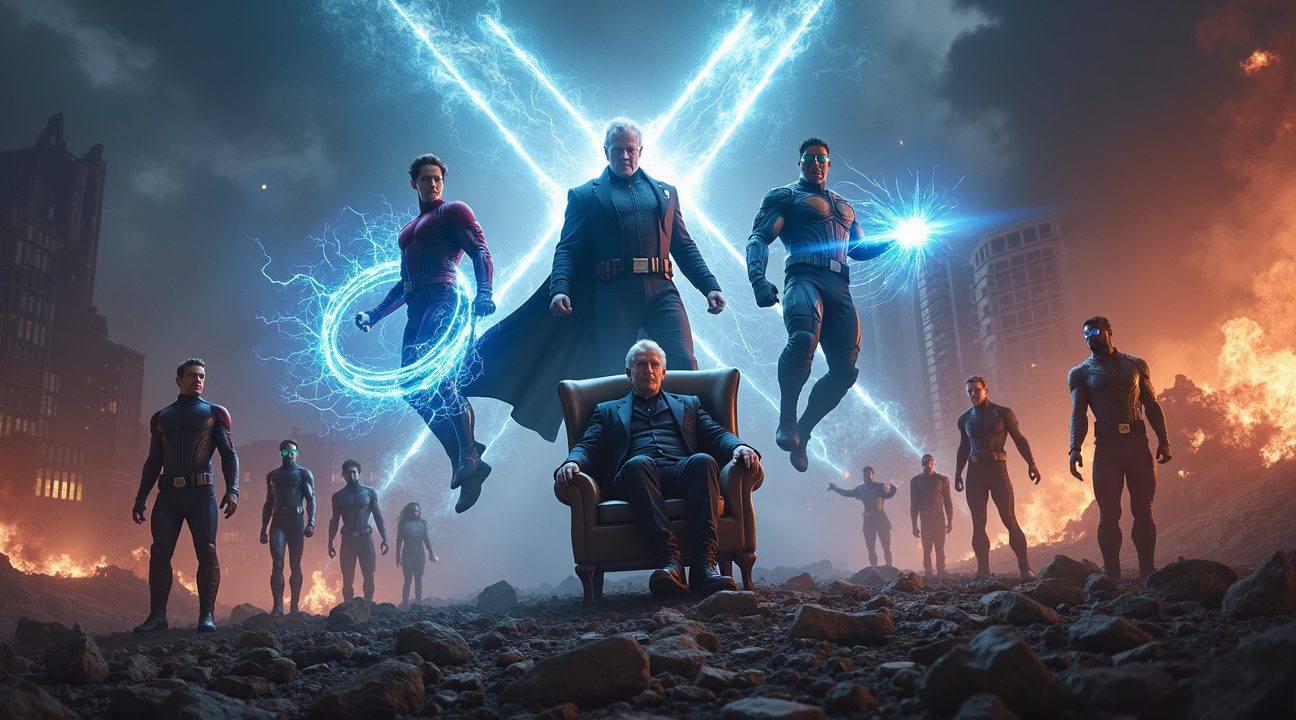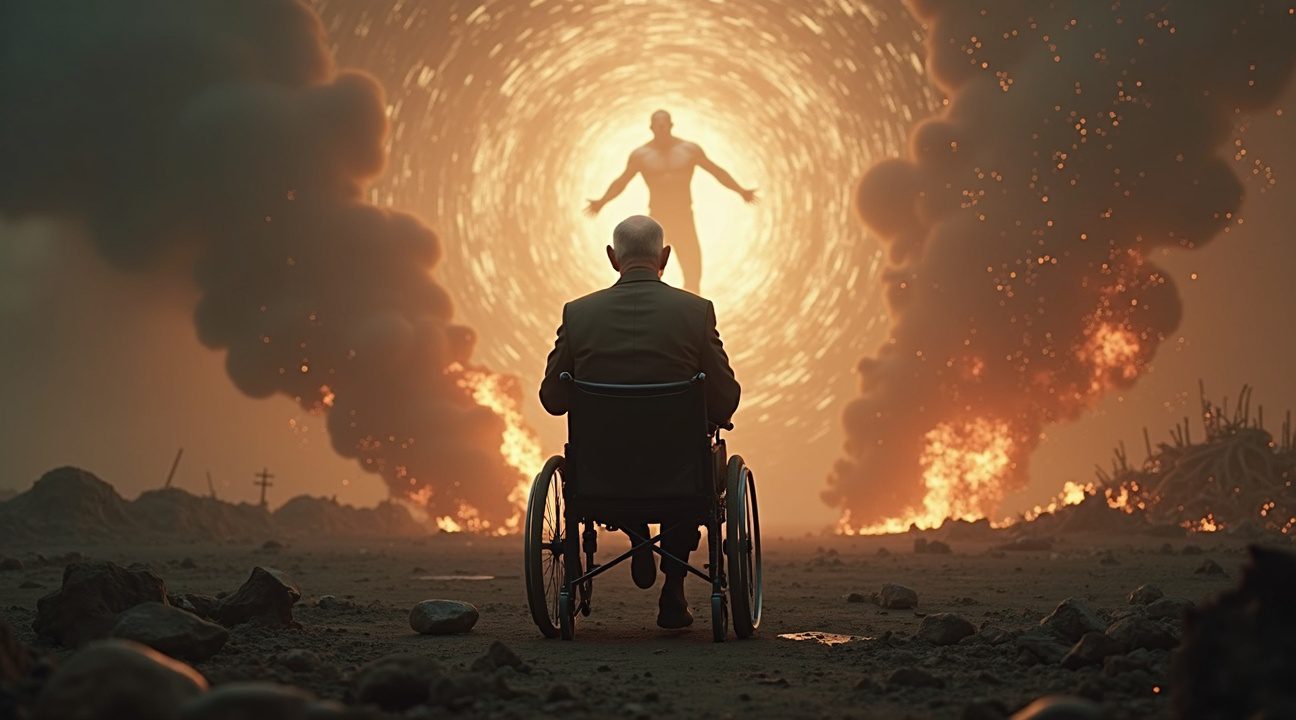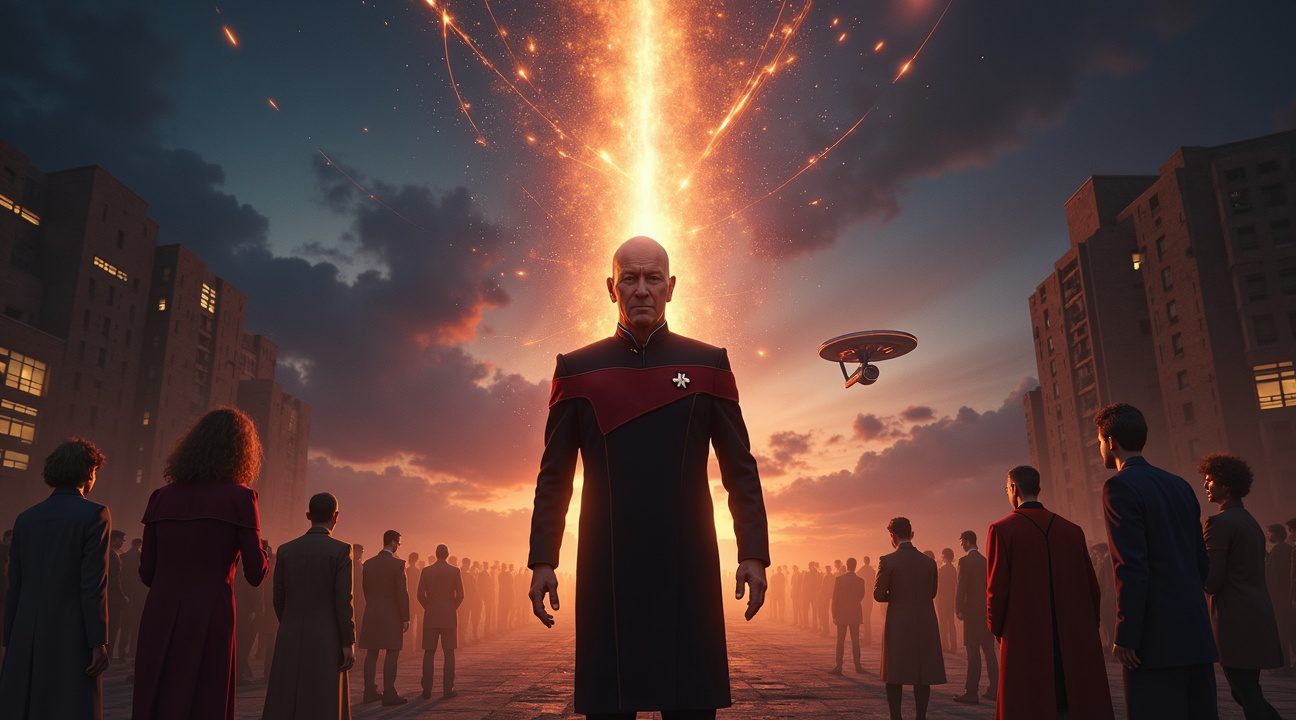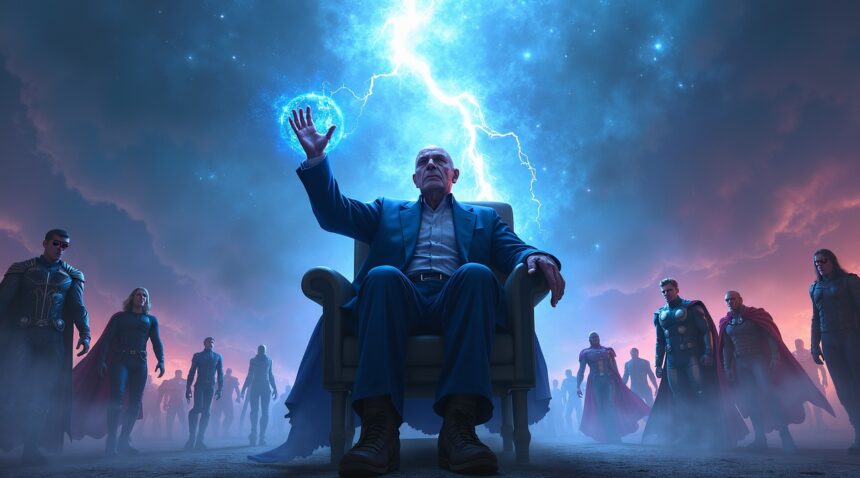Patrick Stewart reportedly considers Avengers: Doomsday his final acting role, marking the potential end of an extraordinary 50-year career at the age of 85.
Key Takeaways
- Patrick Stewart may retire from acting after Avengers: Doomsday, closing a five-decade journey across theater, television, and film.
- The film features a stellar cast including X-Men veterans Ian McKellen, Alan Cumming, and James Marsden, who join Stewart’s Professor Xavier on screen.
- Professor Xavier has died on screen three times in various Marvel films; this latest portrayal may mark his fourth and final departure.
- Stewart’s portrayal of Professor Xavier has spanned over 20 years, establishing him as the definitive version of the beloved character.
- Stewart has had a lasting impact on the sci-fi and superhero genres, legitimizing comic book adaptations and elevating fantasy entertainment into mainstream culture.
Legacy of an Icon
Internationally revered for his iconic roles, Patrick Stewart brought gravitas and depth to the genre of science fiction, first as Captain Jean-Luc Picard in Star Trek: The Next Generation and later as Professor Charles Xavier in the X-Men franchise. His portrayal of Xavier has resonated with fans due to a blend of moral authority and emotional vulnerability.
Looking Ahead to Avengers: Doomsday
Though there is no official statement from Stewart or Marvel Studios, fans and insiders alike view Avengers: Doomsday as a fitting end for a legendary career. The combination of Stewart’s dramatic gravitas with the high-stakes storytelling of Marvel’s cinematic universe promises a memorable farewell.
Patrick Stewart Reportedly Choosing Avengers: Doomsday as His Final Acting Role
Industry sources suggest that Patrick Stewart has selected Avengers: Doomsday as his farewell performance, with entertainment insider Kristian Harloff among those reporting this significant development. At 85 years old during production, Stewart appears ready to conclude a legendary career that has captivated audiences for more than fifty years.
Neither Stewart nor Marvel Studios has provided official confirmation of this retirement announcement. The lack of formal statements leaves room for speculation, though multiple entertainment outlets continue circulating these reports across the industry. This pattern mirrors Stewart’s previous approach to major career decisions, where he often maintains discretion until projects reach completion.
A Pattern of Strategic Career Decisions
Stewart has demonstrated a history of making retirement announcements that don’t always stick permanently. His most notable example occurred after Logan‘s release, when he declared his intention to step away from the Professor X character. Yet he surprised fans by returning for special projects, including his appearance in Doctor Strange in the Multiverse of Madness. This precedent suggests that even if Stewart does announce Avengers: Doomsday as his final role, future opportunities might still tempt him back to the screen.
The entertainment landscape continues evolving, with superhero films dominating box office discussions and legacy characters finding new life through multiverse storytelling. Stewart’s potential involvement in Avengers: Doomsday would represent another strategic move in Marvel’s expanding cinematic universe, particularly as Marvel continues developing its ambitious Phase Five and Six plans.
Stewart’s Hollywood journey began in the early 1970s, establishing him as one of Britain’s most respected stage and screen performers. His transition from Shakespearean theater to science fiction television with Star Trek: The Next Generation proved that classical training could elevate genre material to new heights. The role of Captain Jean-Luc Picard became his most recognizable character for an entire generation of viewers.
His subsequent portrayal of Professor Charles Xavier in the X-Men film franchise demonstrated his ability to anchor ensemble casts while bringing gravitas to comic book adaptations. These performances helped legitimize superhero cinema during its formative years, paving the way for today’s blockbuster landscape where Marvel properties continue dominating entertainment discussions.
The timing of this potential retirement aligns with Stewart’s age and the natural conclusion of many long-running franchises. Hollywood has witnessed other veteran actors choosing their final projects carefully, wanting to end their careers on meaningful notes rather than simply accepting any available role. Stewart’s selection of Avengers: Doomsday, if accurate, suggests he sees significance in contributing to Marvel’s culminating storylines.
Recent developments in superhero casting have shown that studios value experienced performers who can bring depth to fantastical scenarios. Just as Superman Legacy benefits from thoughtful casting choices, Marvel’s approach to legacy characters like Professor X requires actors who understand both the material’s history and its future potential.
The entertainment industry’s current focus on multiverse storytelling provides unique opportunities for veteran actors to revisit beloved characters in fresh contexts. Stewart’s possible involvement in Avengers: Doomsday could represent one final chance to explore Professor X‘s character across different timelines and realities, offering both closure and new possibilities for the role.
While fans await official confirmation from either Stewart or Marvel Studios, the speculation itself demonstrates the enduring impact of his performances. Whether Avengers: Doomsday truly becomes his final acting role or simply another chapter in an ongoing career, Stewart’s influence on both classical theater and popular entertainment remains undeniable. His potential farewell performance would certainly provide a fitting capstone to a remarkable five-decade journey through some of entertainment’s most memorable stories.
Avengers: Doomsday Brings Back X-Men Alumni in Stacked Cast
Marvel Studios has assembled an extraordinary lineup for Avengers: Doomsday, scheduled to hit theaters on December 16th, 2026. The film promises to deliver a cast that fans can only describe as stacked, bringing together beloved characters from across the Marvel universe in what appears to be the most ambitious crossover event yet.
X-Men Veterans Return to the Marvel Universe
The roster includes several X-Men alumni who will make their mark on this pivotal MCU installment. Ian McKellen returns to reprise his iconic role as Magneto, bringing decades of experience portraying the complex mutant leader. Alan Cumming steps back into the blue-skinned teleporter Nightcrawler, while James Marsden returns as the steadfast Cyclops. These veteran actors bring gravitas and established character dynamics that fans have cherished for over two decades.
Patrick Stewart’s Professor X stands positioned to play a critical role in the film’s multiversal narrative stakes. His character’s telepathic abilities and leadership experience make him uniquely suited to address the cosmic-level threats that Doomsday will undoubtedly present. The inclusion of these seasoned performers signals Marvel’s commitment to honoring the legacy of the X-Men franchise while integrating these characters into the broader MCU landscape.
The ensemble nature of Avengers: Doomsday highlights just how significant the X-Men’s involvement has become in the Marvel Cinematic Universe. After years of existing separately due to licensing agreements, these mutant heroes finally join forces with the Avengers in what promises to be an unprecedented collaboration. The film represents a convergence of storylines that fans have anticipated since Disney’s acquisition of Fox’s Marvel properties.
This casting strategy demonstrates Marvel’s understanding that audiences crave continuity with the characters they’ve grown to love. Rather than completely rebooting the X-Men universe, the studio has chosen to weave existing portrayals into the MCU’s fabric. Marvel’s approach to integrating beloved characters has proven successful in recent projects, and Doomsday appears to follow this winning formula.
The multiversal aspects of the story create opportunities for these veteran actors to explore new dimensions of their characters while maintaining the essence that made them fan favorites. McKellen’s Magneto, in particular, brings a complexity and gravitas that few actors could match. His decades-long portrayal of Erik Lehnsherr adds weight to scenes that might otherwise feel purely action-driven.
Cumming’s return as Nightcrawler offers exciting possibilities for both dramatic moments and spectacular action sequences. His character’s teleportation abilities provide unique tactical advantages in large-scale battles, while his spiritual nature could offer philosophical depth to the film’s themes. Marsden’s Cyclops brings leadership qualities that complement Stewart’s Professor X, creating a dynamic that fans remember from the original X-Men trilogy.
The decision to include these established X-Men actors alongside MCU stalwarts creates fascinating possibilities for character interactions that were previously impossible. Marvel’s casting decisions often reflect careful consideration of both fan expectations and narrative requirements.
Stewart’s final performance as Professor X carries additional emotional weight, knowing this represents his last time embodying the character who defined much of his later career. His portrayal has spanned multiple decades and iterations, from the original X-Men films through Logan and recent multiverse appearances. The actor’s commitment to the role has remained unwavering, and his final bow promises to honor both the character and the fans who’ve followed his journey.
The stacked cast approach serves multiple purposes beyond fan service. It creates opportunities for complex storytelling that draws from established character relationships while introducing new dynamics. The film’s narrative scope appears designed to showcase how these different hero teams can work together against threats that require their combined expertise and abilities.

Professor X’s Fourth Potential Screen Death
Patrick Stewart’s portrayal of Professor Charles Xavier has become synonymous with sacrifice and dramatic death scenes across multiple Marvel films. If his character meets his end in Avengers: Doomsday, it’ll represent the fourth time audiences witness Xavier’s demise on screen, creating an unprecedented pattern of mortality for any single character in superhero cinema.
The character’s previous deaths have each served distinct narrative purposes throughout Stewart’s tenure. Jean Grey’s Phoenix force consumed Xavier in X-Men: The Last Stand, marking his first significant screen death in the franchise. Logan delivered perhaps the most emotionally devastating blow when Professor X died in James Mangold’s critically acclaimed film, providing closure to the character’s long journey. Most recently, the Scarlet Witch brutally killed Xavier in Doctor Strange in the Multiverse of Madness, demonstrating the multiverse’s dangerous unpredictability.
Establishing Stakes Through Legacy Character Deaths
Marvel Studios has consistently used the deaths of beloved legacy characters to create immediate narrative urgency and emotional investment. The pattern mirrors successful storytelling techniques employed in recent blockbusters where established heroes face genuine consequences. Consider these examples of how character deaths amplify tension:
- Scarlet Witch’s devastating assault on the Illuminati in Multiverse of Madness shocked audiences and established her as a credible threat
- Thanos’s elimination of half the universe in Infinity War created unprecedented stakes for the Marvel Cinematic Universe
- The deaths of multiple variants across Spider-Man: No Way Home reinforced the multiverse’s dangerous nature
- Iron Man’s sacrifice in Endgame provided emotional weight and closure to the Infinity Saga
Stewart’s potential final performance as Xavier in Avengers: Doomsday could serve similar narrative functions. His death might establish the film’s antagonist as a formidable force while providing emotional resonance for longtime fans. The weight of losing such an iconic character would immediately signal to audiences that no hero is safe in this particular story.
The recurring theme of Xavier’s mortality across different films and universes suggests a deliberate creative choice rather than coincidence. Each death has tested different aspects of the character — his relationship with Jean Grey, his father figure role with Logan, and his leadership of the Illuminati. A fourth death in Avengers: Doomsday could explore his role as a mentor to the broader superhero community.
Stewart’s advanced age and previous statements about retiring from the role add authenticity to speculation about Xavier’s fate. The actor has been selective about his recent Marvel projects, suggesting that any return to the character carries special significance. His appearance in Doctor Strange in the Multiverse of Madness was brief but impactful, demonstrating how even limited screen time can create lasting emotional moments.
The pattern of Professor X’s deaths also reflects the broader evolution of superhero storytelling. Early comic book adaptations rarely killed major characters permanently, but modern films embrace mortality as a storytelling tool. Xavier’s repeated deaths across different timelines and universes acknowledge the multiverse concept while maintaining emotional stakes for each individual story.
Marvel’s approach to legacy characters in recent films suggests they’re willing to make bold choices with beloved figures. The potential death of Stewart’s Xavier in Avengers: Doomsday would align with this strategy while providing a definitive conclusion to his decades-long portrayal of the character. Such a decision would honor both the character’s comic book legacy and Stewart’s significant contribution to the superhero genre.
The emotional impact of a fourth Xavier death would depend heavily on the circumstances and execution. Each previous death served the story’s needs while respecting the character’s dignity and importance. If Avengers: Doomsday follows this pattern, Stewart’s final performance could provide a fitting capstone to his remarkable run as one of Marvel’s most respected characters.

Stewart’s Decades-Long Journey as Professor Charles Xavier
Patrick Stewart’s portrayal of Professor Charles Xavier stands as one of the most enduring character performances in modern cinema. I’ve watched his evolution in this role across multiple decades, witnessing how he transformed a comic book character into a deeply complex figure that resonates with audiences worldwide.
Stewart first donned the telepathic mutant’s mantle in 2000’s X-Men, bringing gravitas and emotional depth to Xavier that elevated the entire superhero genre. His commanding presence and nuanced performance helped establish the foundation for what would become one of the most successful film franchises in history. The actor didn’t simply play a superhero mentor; he crafted a character whose wisdom and moral complexity drove the narrative forward in meaningful ways.
Across at least six different films, Stewart consistently delivered performances that balanced Xavier’s incredible psychic abilities with his fundamental humanity. His portrayal reached particularly powerful heights in Logan (2017), where audiences witnessed an aging, vulnerable Xavier struggling with cognitive decline. This wasn’t the invincible professor fans had grown accustomed to seeing — it was a raw, honest depiction of mortality that showcased Stewart’s range as a performer.
Memorable Deaths and Resurrections
Stewart’s Xavier has faced death multiple times throughout the franchise, with each demise serving crucial narrative purposes:
- X-Men: The Last Stand (2006) – Xavier’s apparent death shocked audiences and set up complex plot developments
- Logan (2017) – His emotional death scene provided closure to the character’s arc while devastating fans
- Doctor Strange in the Multiverse of Madness (2022) – A brutal end that demonstrated the multiverse’s infinite possibilities
Each death scene Stewart performed carried significant weight, often serving as pivotal moments that shaped entire storylines. His ability to bring dignity and emotion to these farewell scenes contributed to the lasting impact of Xavier’s character across multiple films.
Stewart’s cultural influence extends far beyond traditional superhero fans. His background as a classically trained actor, particularly his iconic role as Captain Picard in Star Trek, brought credibility to the X-Men franchise during its early years when comic book adaptations faced skepticism from mainstream audiences. Science fiction enthusiasts embraced his transition from starship captain to telepathic professor, creating a unique crossover appeal that few actors achieve.
The professor’s on-screen presence consistently anchored the X-Men films, providing emotional stability even during the most chaotic action sequences. Stewart’s delivery of Xavier’s philosophical speeches about coexistence between humans and mutants resonated with real-world social issues, elevating the material beyond typical superhero fare. His performance style emphasized Xavier’s role as both protector and teacher, qualities that Stewart embodied naturally through his theatrical background.
Marvel’s recent incorporation of Stewart’s Xavier into Doctor Strange in the Multiverse of Madness demonstrated the character’s enduring popularity and the actor’s continued relevance in the franchise. Even after what many considered his definitive farewell in Logan, fans celebrated his return, proving that Stewart’s interpretation of Xavier remains the definitive version for many viewers.
His decades-long commitment to the character created a legacy that influenced how subsequent actors approach comic book roles. Stewart never treated the material as beneath his considerable talents; instead, he approached each performance with the same dedication he brought to Shakespeare or other classical works. This professional approach helped legitimize superhero films as serious entertainment worthy of critical attention.
The announcement that Marvel finds director for Blade movie and other upcoming projects suggests the studio continues building its interconnected universe, potentially setting up scenarios where Stewart’s final Xavier appearance in Avengers Doomsday could serve as a culminating moment for both the character and the actor’s remarkable journey through multiple Marvel properties.
Stewart’s Xavier performances consistently demonstrated how skilled actors can transform familiar characters into something profound and lasting. His interpretation became the template against which future portrayals of the character are measured, cementing his place in both superhero cinema history and popular culture.
A Science Fiction and Fantasy Legend’s Lasting Impact
Patrick Stewart stands as one of the most revered actors of his generation, commanding respect through his extraordinary range across both genre-defining and dramatic performances. His decades-long portrayal of Jean-Luc Picard in Star Trek established him as a cornerstone of science fiction television, while his equally iconic role as Professor Charles Xavier in the X-Men film franchise cemented his status in the superhero genre. The rumored announcement that Avengers: Doomsday will serve as his final acting role would represent the perfect capstone to a career filled with transformative performances.
Stewart’s influence extends far beyond individual characters, shaping entire franchises through his commanding presence and emotional depth. His ability to bring gravitas to fantastical scenarios has made science fiction and fantasy more accessible to mainstream audiences. From commanding the USS Enterprise bridge to leading a school for gifted mutants, Stewart consistently elevated material through his classical training and theatrical background.
Fan Devotion and Cross-Generational Appeal
The emotional reactions from fans following news of Stewart’s potential retirement highlight the profound connection he’s forged across multiple generations. Many supporters expressed particular disappointment after Star Trek: Picard concluded in 2023, having hoped for additional projects featuring the beloved captain. Fan petitions have circulated requesting Stewart’s return to various franchises, demonstrating his enduring popularity decades after first donning Starfleet uniforms.
Stewart’s cross-generational appeal manifests through several key factors:
- His ability to balance authority with vulnerability in leadership roles
- Consistent delivery of memorable speeches that resonate with viewers
- Seamless transitions between dramatic moments and lighter character interactions
- Mentorship qualities that appeal to both young and mature audiences
This widespread admiration has led to numerous calls for Stewart’s appearance in other franchises, including Marvel projects beyond his X-Men commitments. His theatrical background brings Shakespearean weight to even the most outlandish science fiction concepts, making him a sought-after presence in major productions.
Stewart’s potential final bow in Avengers: Doomsday would unite two of his most significant franchise contributions under one cinematic umbrella. The Marvel Cinematic Universe’s multiverse concept provides the perfect vehicle for bringing together his X-Men legacy with Earth’s Mightiest Heroes. This convergence represents more than nostalgic fan service—it acknowledges Stewart’s fundamental role in establishing the modern superhero film landscape.
His influence on comic book adaptations cannot be overstated. Stewart brought legitimacy to superhero films when they were still considered niche entertainment, paving the way for today’s dominant blockbuster landscape. His commitment to character development within fantastical settings established a template that countless actors have followed.
The timing of this rumored farewell feels particularly poignant given the current state of both Star Trek and X-Men franchises. With new iterations of both properties in development, Stewart’s departure marks the end of an era while potentially passing the torch to new generations of performers. His legacy will undoubtedly influence how future actors approach iconic roles in science fiction and fantasy properties.
Stewart’s impact transcends individual performances, fundamentally changing how audiences perceive genre entertainment. He proved that science fiction and fantasy could serve as vehicles for serious dramatic exploration rather than mere escapism. This approach has influenced everything from superhero storytelling to space opera narratives.
If Avengers: Doomsday truly represents Stewart’s final curtain call, it would conclude one of entertainment’s most distinguished careers. His contributions to science fiction and fantasy have elevated entire genres, inspiring countless performers and creators while delivering unforgettable moments that continue resonating with fans worldwide.

Sources:
Cinemablend, IMDb News, Everything Always, Inverse, Men’s Journal


